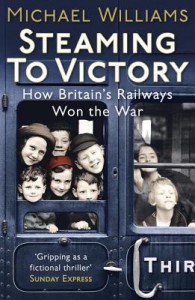More a homage than a history

When Britain went to war in 1939, they did so by rail. For at a time when air travel was enjoyed only by the few and automobiles nowhere nearly as ubiquitous as they would become, railways were the dominant form of long-distance transportation in the country. This was underscored over the next six years, as trains were employed in a range of tasks from evacuating children from London at the start of the war to preparing for the massive D-Day invasion that ended it.
The role Britain’s railways played in the war deserves a history that details their wide range of activities while analyzing the extent of their contribution and describes how they made it possible. Unfortunately, Michael Williams’s book is not that work. While he details in it the many roles the railways played, he does so in a way that is more adulatory than analytical — so much so that a more appropriate subtitle for this book would be “A Celebration of Britain’s Railways in the Second World War,” for that would better capture the tone of his narrative. This is reflected best in his focus on the individual stories of the men and women who worked for the railways during the war, where they coped with straitened circumstances and the dangers of attack. Chapter after chapter contain tales spotlighting the heroism and sacrifice of railway employees, yet there is little effort to connect these episodes to any broader explanation of railway operations or assessment within the context of the overall war effort. This reflects his sources, as apart from a series of oral histories with the now-elderly survivors Williams bases his book on a limited number of previously-published accounts, most notably the self-congratulatory wartime histories put out by the “Big Four” railway companies immediately after the conflict. Expanding his research by consulting the archival records or by incorporating the vast body of literature about British mobilization would have made for a much stronger work that gave readers a more in-depth understanding of the contribution of Britain’s railways to the war effort.
Because of this deficiency, Williams’s book functions as more of an homage than anything else. This is particularly regrettable given the case the author makes within it for a good, thorough study of British railways that pushes past the myths and misconceptions that have accumulated around their role in the war to detail the many roles they played in it. In the end, though, what Williams provides his readers with is not a book that explains “How Britain’s Railways Won the War,” but simply salutes it as something to be assumed.






